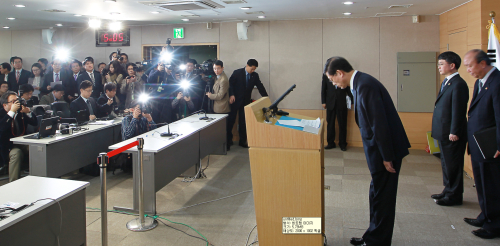Ministry ditches Lee’s election pledge, citing economic viability
The government’s decision to ditch a plan to build a new international airport in the southeastern part of the country drew angry backlash from legislators Wednesday ahead of the by-election next month as well as the general and presidential elections next year.
The airport was one of President Lee Myung-bak’s election campaign pledges in 2007.
A panel assigned with the feasibility study concluded that neither of the final candidate sites ― Miryang in South Gyeongsang Province and Gadeok Island near Busan ― was suitable for the project citing economic viability, the Land Ministry said Wednesday.
Prime Minister Kim Hwang-sik apologized to the people of Yeongnam, or the southeastern Gyeonsang provinces, and said that the government will seek measures to make the existing Gimhae airport more convenient for them.
 |
Prime Minister Kim Hwang-sik bows during a press conference on Wednesday. (Yonhap News) |
“(The government) will push for steps to improve the existing airport conditions to help connect more international air routes (to Gimhae) and reduce inconvenience in using the airport,” Kim said.
“The government has once again realized that the economic and technological feasibility of a state project must be thoroughly reviewed from the very beginning.”
Kim also mentioned that the Lee administration has “deeply acknowledged” that a certain state project should not cause regional conflict.
President Lee said he felt “heavy-hearted” as he received reports from Kim and Land Minister Chung Jong-hwan, according to Lee’s senior presidential aide for public relations Hong Sang-pyo.
Lawmakers from around Busan had supported Gadeok Island while those representing the Gyeongsang provinces and Daegu had backed Miryang. The ruling Grand National Party’s lawmakers were especially hyped up as their failure is expected to affect the April 27 by-election in Gimhae, South Gyeongsang.
The cancellation had been rather expected, however, as several ruling party heavyweights such as former National Assembly Speaker Kim Hyung-o suggested reconsidering the airport.
Nevertheless, GNP lawmakers representing the Daegu and Busan areas took aim at the government.
“Failing to implement the pledge of the president and the party is a betrayal of the people,” Rep. Park Jong-geun of Daegu said.
“(The government) did not start the four-river development, the Saemangeum reclamation or the Gyeongbu Express projects because they got high marks in the feasibility study. They were started with political judgment for the nation’s balanced development and vision for the future.”
Park said that the next administration should push for the airport construction in his region, adding that he will hire a global research firm, if necessary, to prove its economic viability.
Rep. Seo Byung-soo of Busan, a member of the GNP’s supreme council, said he was “enraged by the government’s evasive conclusion” and vowed to continue efforts to have the airport built on Gadeok Island.
The main opposition Democratic Party also slammed the Lee administration for not keeping its word.
DP spokesperson Cha Young said the latest reversal “felt like a slap in the face,” adding that the president will lose the people’s trust for breaking his promise.
GNP’s factional leader Park Geun-hye, Lee’s political archrival and the party’s strongest presidential hopeful who represents Dalseong County in North Gyeongsang, was also expected to comment on the cancellation during her visit to Daegu on Thursday.
Park is popular for her emphasis on political consistency and keeping one’s word. She has openly opposed several key policies of the Lee administration such as the scheme to scrap the relocation of government ministries to Sejong City in South Chungcheong Province last year.
As consolation for the people of Yeongnam, the governing bloc is considering building a high-speed railway line that connects the existing Seoul-Busan KTX network with Incheon International Airport.
This would allow KTX passengers from Busan to reach Incheon airport within two hours. It would take about an hour and half from Daegu to the airport.
A senior presidential aide reportedly said the government could raise the train’s speed from the current 300 km/h to 350 km/h, and that the new line could run between the airport and Gwangmyeong Station or Cheonan Asan Station.
It costs about 42.6 billion won to build a kilometer of KTX track, which means construction of a 50.7-kilometer route from Gwangmyeong to Incheon airport would cost over 2.1 trillion won, and a 136-kilometer route from Cheonan Asan 5.8 trillion won.
By Kim So-hyun (
sophie@heraldcorp.com)








